🖊 This article was last updated on February 26, 2020
I have to confess something.
I have a love-hate relationship with my Motivation…
I mean, she’s amazing when she’s around (it must be a “she”, right?) and she’s done some amazing things for me at times. She has also helped me move forward in ways I never dreamed possible and I don’t think I could’ve done this on my own. I feel like she’s my soulmate and she will always be a part of me.
But she has also betrayed me and let me down in the moments I needed her the most… I screwed up more opportunities than I can remember, simply because she wasn’t there for me during the important moments in my life. At moments and opportunities that could’ve changed my life and future forever. And I truly blame her for that.
Maybe it was my own fault that I counted on her. Maybe I should have manned up and faced all these challenges alone. Maybe… But can you blame me for gradually depending more and more on my Motivation, after all these years that she has been by my side? After all the great things she has done for me? I’m human too, right?
Is it not natural to feel the need for companionship and to count on my dear Motivation to be there? When she had clearly promised me she would stand by my side whenever I needed her the most?
And it’s not like this was a one-way street either. I mean, I’ve always been there for her whenever she felt down: I fed her motivational video’s, quotes, books, and movies. I even went as far as trying that whole “The Secret” thing when things were looking really dim, convincing her we would be all right if we only just mustered the strength to keep on going. We’ve weathered countless storms together, for as long as I can remember…
The breakup

But you know what the problem is? I can’t trust her. Sometimes she’s there Sometimes she’s not. sometimes she helps me tremendously (for which I am forever grateful) and sometimes she’s nowhere to be seen.
After a while (in hindsight, it took me way too long to realize) something started to dawn on me. I didn’t like the thought, I resisted it, but finally, I had to be truthful to myself and I had to admit that she’s not the one for me.
Trust me, this was not easy to realize. She had been by my side for so long, she had done so much for me… But if your Motivation lets you down too many times, promising over and over it will never happen again, but without putting in any effort to change, there’s really only one choice you can make.
I broke up with her. It was hard.
But I’m at peace with it now and I feel better than ever before. We still see each other now and again and we’re still on friendly terms. But the arrangement we now have is more of a “friends with benefits” kind of thing. And I really like it that way. I’m more independent now and when she’s around, it’s amazing. But when she’s not, that’s okay too. As hard as it was, I’ve learned to let her go and to take my future into my own hands, without depending on my Motivation to move me forward when things get though.
A new love
I also reconnected with someone who I’ve known like forever, but wasn’t close to for some reason, her name is Willpower. I’m starting to grow really fond of her and I think you would like her too. Motivation and Willpower didn’t get along, which is probably the reason why I didn’t really connect with Willpower before. Motivation was really jealous in that way…
I can see why too, because Willpower is a lot different. For starters, she made it very clear that if I wanted her by my side, I’d have to work for it. I’ve also noticed that it’s easy to scare her away too, so I’ve got to be careful about that. But so far, she’s really growing on me.
We’re taking baby steps and slowly growing towards each other. Slow but steady is the way now, a big difference with the rollercoaster relationship I had with Motivation. But I really prefer it this way because I feel I’m building a foundation I’ll be able to trust on for the rest of my life.
How I used to depend on motivation (this is the real stuff)
If you are anything like me, you probably recognize the relationship I had with motivation in the metaphor above (you realized it’s a metaphor, right? Whew! I knew I had smart readers). In the story, I also mentioned why I stopped depending on motivation to get into action (I’ll explain why in a second) and how befriending willpower really helped me forward (more on that later too).
But first, let’s get back to motivation: what is it actually? Well, according to the dictionary:
Motivation [mass noun]: Desire or willingness to do something; enthusiasm.
– Oxford Dictionary
In fact, I would boil it down even further: in essence, motivation is wanting to take action. If you’re motivated to exercise, you want to do a physical activity. If you’re motivated to get healthy, you want to eat healthier food. If you’re motivated to play the piano, you want to sit at the piano and play a tune. You’re a smart person, you get the point.
This is also the moment where I make fun of people who tell me they want to get motivated. If we substitute our definition, they essentially want to want to take action. That’s just ridiculous and it just makes no sense. (I hope they read this article so next time I don’t have to use any willpower to keep a straight face and refrain from making a comment I’ll regret.)

Okay, now that we know what motivation is and that we have that pet peeve of mine out of the way, let’s take a look at the awesomeness of motivation, it’s really a great thing:
- It generates positive thoughts
- It boosts your determination
- It gets you excited
- It is exciting in itself
- It increases your desire and likelihood to take action
Impressive huh? What’s not to like about that? It’s clearly better to be motivated than to not be motivated.
By now you’re maybe wondering what I keep rambling about, where this article is going, or maybe you’ve already scrolled down quickly to read my conclusion (stay with me, the great stuff is coming). Or maybe you have a daunting feeling that motivation is not perfect and is not all that it’s cracked up to be. Or maybe, just maybe, you’re part of the 100% of all people who have had times in their day, week, month and year where they just didn’t feel motivated to do something.
Whether it’s exercising more, eating healthier, reading more, cleaning your house or doing the dishes, … we’ve all had times where we just didn’t feel like it (and that’s okay!) and had no motivation to take action. So you didn’t take action: you binged on Netflix with some chips/ chocolate/beer/glass of wine/cup of tea, and you probably felt guilty about it too.

If only you would’ve had more motivation! (that’s where the wish for having more motivation comes from by the way. Which, all previous joking aside, is actually a normal reaction for people who don’t know what you will know by the end of this article).
Well, no. You see, motivation is simply too unreliable. Sometimes you’re motivated, sometimes you’re not. And there’s actually not much more to say about it. It’s not your fault, you’re not a weak human being. It’s normal, we all have it and we will always have it.
But I’ll tell you a secret right now:
You don’t need motivation to take action.
*gasp!*
That’s right, you can take action even when you don’t feel like it, because there’s a better, more reliable alternative available that I will tell you about in a minute.
How to make sure you fail in life
Okay, I admit this title is a little overdramatic, but I really wanted to get your attention here. Also, there truly IS a way to make sure you fail in life.

You know, for more than 30 years I depended on motivation to get fit, healthy, read more, pay more attention to my friends and family around me, and build (other) better habits. But guess what, I was fat, unhealthy, never read books and neglected the important people in my life. Not really the outcome I was looking for, was it? And for far too long, I blamed myself: I convinced myself I didn’t have the strength to finish my goals, that I was weak and I just thought of myself as a bad person who didn’t have what it takes. Was I a failure? Maybe not, but I sure felt like one. What a way to go through life, right?
If getting motivated to take action is your strategy, you’ve set yourself up for failure.
And just like in the story in the introduction, I finally mustered all my courage, decided it was enough and started searching for a solution. What I found out was staggering, because…
I had it all backward
Like many people, I grew up with the conviction that if you’re just motivated enough, you can do anything. For all my life, I was convinced that all it took was (more) motivation to create better habits and achieve personal growth.
Boy, was I wrong.
You see, to take action, there’s a certain threshold we need to cross, a level of willingness or amount of energy that is required to take that action. The easier the action, the lower that threshold will be. The more daunting the task, the higher it will be (I’ll give you a workaround for this inconvenience later).
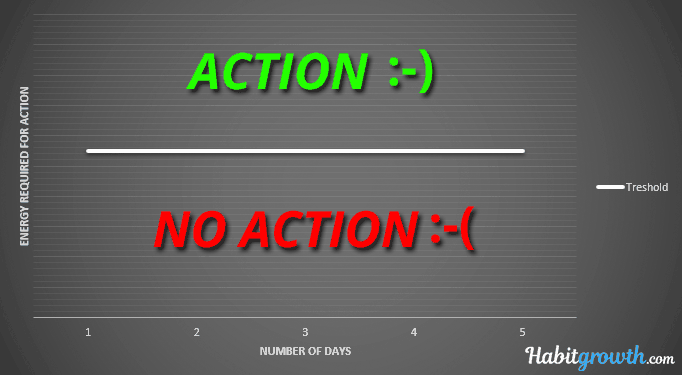
Now, what makes up this level of willingness is a combination of three things:
- motivation
- willpower
- habit
Motivation + willpower + habit = action
As we’ve already mentioned, motivation is unreliable and no matter what you do or no matter how many motivational videos, books or seminars you watch, read or go to: motivation sadly is, and always will be, temporary in nature. If we’re looking for a consistent method that always works to get ourselves to take action, our motivation is not something we can rely upon and as I already mentioned in the previous (little overdramatic) chapter: it’s a recipe for disaster.
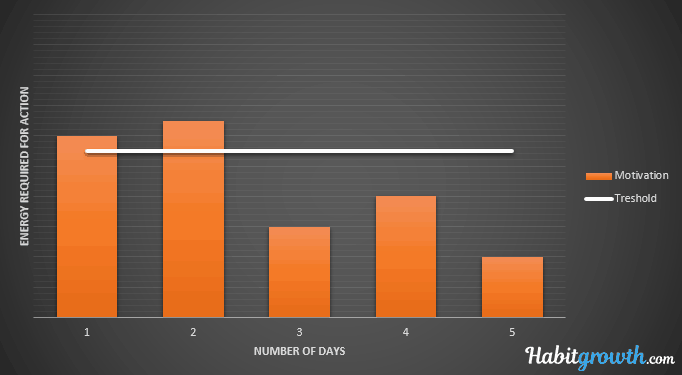
Habits
So onto the next part of the equation: habit. Habits are really cool, a statement you’d probably expect for a guy writing articles on a site called Habit Growth. But the part it plays in the formula above is really interesting because every time we take (the same) action, like exercising or eating healthy or any other habit we want to create, it increases a tiny bit.
If you just do something long enough, it becomes a habit and it will require you no mental effort (motivation or willpower) anymore to take that action.
The best examples here are taking a shower and brushing your teeth every morning, or putting on your pants and tying your shoes. I really hope you don’t need a lot of motivation or willpower to do this, it’s just something that is a part of your daily morning routine and comes naturally to you. It’s actually almost effortless and requires little to no mental energy (flossing on the other hand…). And this concept can be applied to any habit you want to create. How awesome is that?
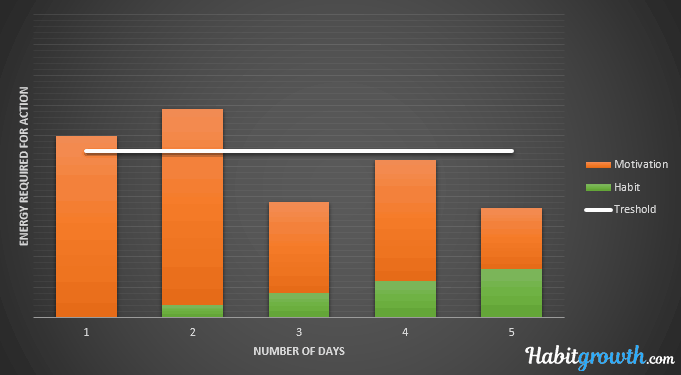
There’s no hard rule on how long it takes to form a habit. A study found that participants took an average of 66 days to form a habit, but with a crazy range of 18 to 254 days. We can conclude that our brain changes quite slowly, but the exact speed at which it does for any given behavior is totally unpredictable.
But the actions we’re talking about here are not habits (yet), because otherwise, we wouldn’t have this conversation about motivation, right? So let’s assume that our habit-level is zero or quite low right now. It’s something that will be insanely helpful in the future, but not at this moment just yet. Not right now when you’re at the restaurant buffet, with this delicious looking cheesecake staring you at the face and your confidence wavering. You don’t yet have (enough) habit to skip the desserts and scoop up at the fruit station instead.
What you truly need right now, is…
Willpower
Willpower is similar to motivation, but ridiculously underrated. Look at those poor people searching for motivation, while what they probably really needed was a habit (long-term) and willpower (short-term)… At first glance, it might seem like willpower is almost a synonym for motivation. The Oxford dictionary, however, does not agree (and neither do I).
Willpower [noun]: Control exerted to do something or restrain impulses.
– Oxford Dictionary
Now, this is a whole different thing than motivation, which if I may remind you, is “Desire or willingness to do something” (thanks for letting me remind you).
Anyway, I kind of get why willpower has gotten a bad rap, because if used improperly, it has the same reliability problems as motivation. “But Kristof”, you ask me, “if we don’t have a powerful habit yet and both motivation and willpower are unreliable, how can we ever resist on eating that delicious cheesecake?”. That’s a very good question reader, thank you for asking. You see, the key here is willpower can be unreliable if you don’t know how it works, which most of us don’t. But let me fix that for you.
It’s crazy how we’ve had access to a superpower our whole life without even knowing it and not using it properly. But that’s in the past now, because I’ll explain to you how willpower works and how we can use it to take action and create better habits.
You see, willpower is a limited resource. Research on this topic, called “ego depletion”, has shown that willpower is like a muscle: the more you use it during the day the faster it depletes, up to a point where you don’t have any willpower strength anymore if you “used it all”, just like muscle fatigue. This is, for example, the reason why it’s harder to do a workout after an exhausting day at work, instead of in the morning when you’re physically and mentally rested after a good night’s sleep.
But willpower acts like a muscle in another way too: the same research has also shown that willpower can be strengthened, just like a muscle and it increases over time the more it’s used.
This is awesome news because if we take another look at our equation: Motivation + willpower +habit = action, this means that, if we can use enough willpower, we can take action, whether you are motivated or not.
Are we there yet?
Okay, so now we know that we need a combination of motivation, habit, and willpower to take action. We know that the sum of these 3 must be above the action threshold. We also know that our motivation may or may not be there, it could be low or high, the only thing we’re sure of is that it’s unreliable. The habit part is something that will grow over time, so that’s something to be optimistic about and to look forward to. We almost have the solution: all we need is enough willpower and we’re all set, right?
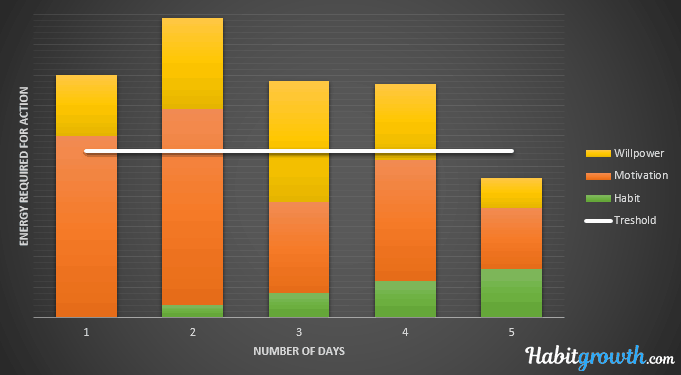
“But Kristof”, you ask, “what if our willpower is depleted or we simply have not enough to do the task”? Another great question reader, please keep them coming (and kudos for remembering and writing my name correctly). You see the title of the article, how it says “the surprising truth about motivation”? It may have seemed like clickbait to you (don’t worry, this will not turn into BuzzFeed), but I held back the surprising truth until we’re both ready.
There’s actually another way to get motivated that I didn’t tell you about:
Taking action is actually the best (and often only) way to motivate yourself.
*gasp*
Now, before you go all crazy on me, hear me out. You probably know that mind and body are intimately connected. That’s actually kind of obvious, as your mind is IN your body, but now it’s also scientifically proven. Research has shown that when you take action first, your mind tends to align with your body by getting motivated. Why? Because when you take action, your body “acts motivated” and your mind will follow with motivation too!
And this very important research brings us the key to solve our equation. It’s the solution we were looking for: Take action, whether we’re motivated or not.
Now, I understand if this sounds like a true catch-22 to you. You might be thinking: “This is stupid. How can you get motivated by taking action, if you’re not motivated enough to take action?” Well, the answer to that is so simple that it’s brilliant: you lower the action threshold so less effort is required to do it.
And as much as I’d like to step into the spotlight to receive the award for “best solution for habit creation”, all honor goes to Stephen Guise. He is the author of the best-selling book Mini Habits, where he explores this topic in more detail. (It’s a great book, I really recommend it)
Mini actions
By now we have a thorough understanding of the left side of the equation: motivation, willpower, and habit. But while personal development has focused almost only on that left side of the equation, Stephen Guise advocates decimating the action into a “stupid, small step”. If the intended action is ridiculously small, then the sum of motivation, willpower, and habit will always be greater than the threshold needed to perform that small action.
He reduces his exercising habit to just one pushup per day, his writing habit to 50 words per day and his reading habit to only two pages per day. Of course, he allows himself to do more than that if he wants to (which he often does), but if he doesn’t feel like it (which sometimes happens) these “stupid small steps” are enough to meet his daily goal.
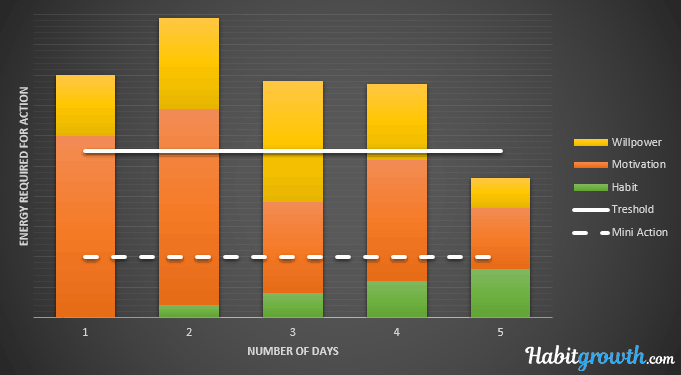
I’ll let the author explain why this works: “If I ask you to touch your nose right now, you will be able to do it. Your momentary motivation to do it is probably weak, because the only reason to do it is that I asked you to and you might want to experiment. You know that no tangible benefit will come from doing it. It’s possibly annoying to consider doing something so trivial. And yet, if you decide to touch your nose, even if you are not motivated to do it, you still can.”
It’s so simple it’s brilliant. Let’s go over the main benefits of this concept:
- On “bad” days (when your motivation and willpower are zero to none), you’ll still be able to do your “mini action”. Which may not be much (it shouldn’t, it’s mini), but it’s still a lot more than nothing and these little actions still add up. (compound interest, anyone?)
- By reducing the action you want to create to something you can easily do every single day, you create a powerful habit which will lead to lasting change.
- By taking action, your motivation will increase (as discussed before), which increases the likelihood to do another step, and another. This creates a feedback loop and before you know it, you’ve exercised 30 minutes, read 20 pages or written 500 words.
- The hardest part is often getting started, this method makes getting started a breeze.
There are some caveats to be aware of though:
- Don’t be tempted to make your “stupid small step” bigger than it needs to be. If you can’t find yourself to do it every day, it’s too big.
- Really set the goal for yourself to that “stupid small step”. More often than not, you’ll be able to do a lot more than just that small step, but don’t beat yourself up if you only did that small step. If you did it, you met the goal you set for yourself and you can move on.
How to apply this to your life
The key lessons I want you to take away are these:
- Stop looking for more motivation. Motivation is unreliable and unpredictable, just accept this and move on, don’t rely on it.
- Train your willpower by deliberately doing things whether you don’t feel motivated or not. This will train your willpower ability and help you more and more in the future.
- Creating habits will remove or decrease the amount of motivation and willpower you need to take action, freeing your motivation and willpower to tackle other tasks and habits.
- Create habits by reducing a recurring action to a “stupid small step” that you can easily do, whether you feel like it or not.
Free worksheet!
I have created a worksheet that helps you implement what I discussed in this article. If you’re already a subscriber you have already received it via mail. If you’re not a subscriber (yet), you can download the worksheet totally for free by clicking on the button below
- These Black Friday deals will skyrocket your productivity (2021 edition) - November 11, 2021
- How to Stay Productive as a Digital Nomad - December 23, 2019
- When is the right time to outsource? - December 3, 2019


